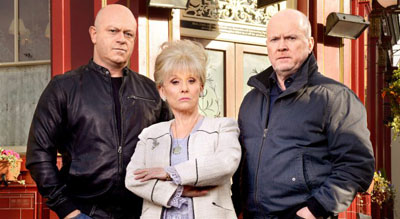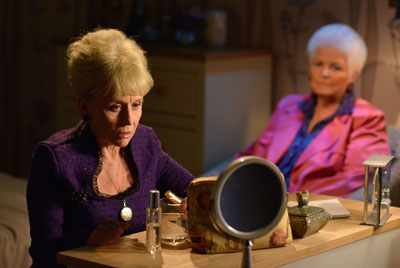Feature
The death of Peggy Mitchell and "real" London
TV Feature
Ed Williamson
18th May 2016
If Eastenders were realistic, there'd be no Peggy Mitchells. Hers is a London where a pub landlady can return after six years and be greeted warmly in the street by tens of people still living there, all bound together by family ties and regular community events, rather than vaguely recognising each other as the person they used to be on the same daily train commute with and avoiding eye contact. But that's not the point.
These choices are made for narrative purposes, obviously, because it'd be crap if all the characters weren't around Albert Square during the day because they worked elsewhere (Bradley Branning, an exception who worked in the City, was roundly treated as some sort of shaman for doing so), or went off to university in Hull for three years and were seen only in the holidays, unable to fully participate in any storylines. But they also serve to present an idea of community in which a figure like Peggy Mitchell makes absolute sense.

The soap pub is a construct of convenience: you need somewhere a lot of characters can be at once and would logically gather and converse, and in modern Britain that doesn't really exist. Communities in London are small, disparate, erected and collapsed as quickly as you leave a job and don't drink with your old colleagues on a Friday anymore, or your Sunday five-a-side team gives up the ghost because everyone has kids now. If the soap pub was simply run as most are in real life – by a series of rotating Australian bar staff you sort of recognise if you've been in more than five times and might even end up on nodding terms with – there'd be a missed opportunity to mythologise its status as a community beacon, so it needs to be run by someone who can step up to iconic classification. Like Danny Dyer.
Or Barbara Windsor, about as British an icon as you'll find, being a romantic totem of the Krays-era climb out of post-war austerity and later the champagne-and-cigars swinging London of the early 1960s. She was always perfect casting for what Eastenders strives to project: "real" London. This is largely a sentimental construct, much like the increasingly irrelevant idea that foreign-owned and comprised Premier League teams need a "British spine" of players to retain a local connection to the club, no matter that the fans are happy enough if everyone's Mexican as long as they win. But it's fair to say that Eastenders should at least attempt to maintain a tie with its setting's roots, even if in real life it would be populated entirely by hedge fund managers there for the school catchment area and quick journey into Liverpool Street, who never set foot in their local pub.
I didn't enjoy Peggy's last episode much: it ended abruptly, missed an opportunity for a satisfying tie-up by having her trick Phil and Grant far too easily into thinking she didn't have enough pills to do herself in, and didn't feature Ronnie or Roxy, always the best Mitchells, at all.

Much better was Friday's walk down memory lane as she and Phil took a tour around London in scenes that felt natural and semi-improvised. The transplanting of the action away from Albert Square removed the context of soap's anti-realism and gave it the air of two friends saying goodbye. You got a sense that this was a farewell to Windsor as well as Peggy, the streets they walked down looking like the Bethnal Green terraces where she grew up. ("Real" London, if you like.) Her accidental "knockers" joke was a pure Carry-On nod, nothing like Peggy.
Strong women are a consistent feature of soaps and have agency rarely seen in other forms of drama. They don't just react to treatment by men or act as foils; they instigate storylines and dominate them. While Peggy's final episode sold the character a little short, the framing of it didn't: the build-up, strategic spoilers in the press and iPlayer exclusive "Last Orders" content did her proud, leaving you in no doubt that this was significant, and that Eastenders remains culturally so. Even if it is out of step and unrepresentative of modern London, its most iconic characters transcend it, and can still make a mark on the public consciousness. 
Support Us
Follow Us
Recent Highlights
-
Review: Jackass Forever is a healing balm for our bee-stung ballsack world
Movie Review
-
Review: Black Widow adds shades of grey to the most interesting Avenger
Movie Review
-
Review: Fast & Furious 9 is a bloodless blockbuster Scalextric
Movie Review
-
Review: Wonder Woman 1984 is here to remind you about idiot nonsense cinema
Movie Review
-
Review: Borat Subsequent Moviefilm arrives on time, but is it too little, or too much?
Movie Review
Advertisement
And The Rest
-
Review: The Creator is high-end, low-tech sci-fi with middling ambitions
Movie Review
-
Review: The Devil All The Time explores the root of good ol' American evil
Movie Review
-
Review: I'm Thinking Of Ending Things is Kaufman at his most alienating
Movie Review
-
Review: The Babysitter: Killer Queen is a sequel that's stuck in the past
Movie Review
-
Review: The Peanut Butter Falcon is more than a silly nammm peanut butter
Movie Review
-
Face The Music: The Bill & Ted's Bogus Journey soundtrack is most outstanding
Movie Feature
-
Review: Tenet once again shows that Christopher Nolan is ahead of his time
Movie Review
-
Review: Project Power hits the right beats but offers nothing new
Movie Review
-
Marvel's Cine-CHAT-ic Universe: Captain America: Civil War (2016)
Movie Feature
-
Review: Host is a techno-horror that dials up the scares
Movie Review
